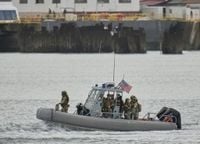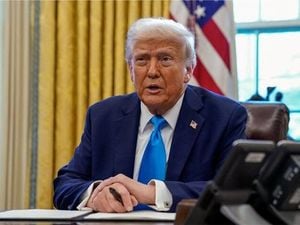On Monday, September 15, 2025, the Trump administration took the extraordinary step of adding Colombia to the list of nations failing to cooperate in the U.S.-led war on drugs, marking the first such designation in nearly three decades. The move, which comes amid a surge in cocaine production and growing tensions between Washington and Bogotá, has sent shockwaves through diplomatic circles and raised questions about the future of one of the United States’ most important alliances in Latin America.
According to the Associated Press, the decision was announced as part of a broader White House strategy targeting drug trafficking networks across the hemisphere. President Donald Trump, speaking from the Oval Office, highlighted the administration’s recent military operations in the Caribbean, including a strike on a Venezuelan vessel allegedly linked to violent drug cartels. “We have proof, all you have to do is look at the cargo that was ... spattered all over the ocean. Big bags of cocaine and fentanyl all over the place,” Trump told reporters Monday afternoon, emphasizing that the U.S. military had acted in international waters and that no American personnel were harmed in the operation.
The strike, which reportedly killed three men, was the second such action in recent weeks. A nearly 30-second video released by the White House appeared to show the targeted vessel exploding and burning at sea. Trump framed the operation as part of an escalating campaign against what he described as “extraordinarily violent drug trafficking cartels and narcoterrorists” that threaten U.S. national security and foreign policy interests. “When they come by land, we're going to be stopping them the same way we stopped the boats,” Trump added, hinting at the possibility of future land-based interventions against suspected traffickers.
The military buildup in the southern Caribbean has been hard to miss. Five U.S. F-35 fighter jets landed in Puerto Rico on September 13, 2025, joining at least ten stealth fighters, seven warships, and a nuclear-powered submarine already deployed to the region. Defense Secretary Pete Hegseth, addressing sailors and marines off the coast of Puerto Rico, declared, “We will track them, kill them, and dismantle their networks throughout our hemisphere — at the times and places of our choosing.”
Yet the administration’s aggressive posture has not gone unchallenged. Human rights advocates and legal experts have raised alarms about the legality of the strikes. Brian Finucane, a former attorney in the U.S. State Department, wrote in Just Security that “there is simply no credible argument that an armed conflict exists involving the United States and whoever was on that boat.” He continued, “With neither of these facts being present, we are left with the premeditated killing of human beings, not in armed conflict and not in self-defence.” Daphne Eviatar, director of Amnesty International USA’s Security with Human Rights Program, was even more blunt: “Let us be clear — this may be an extrajudicial execution, which is murder. There is absolutely no legal justification for this military strike.”
In Congress, skepticism has been bipartisan. Several senators, including Democratic Senator Adam Schiff of California, have questioned the administration’s rationale and the use of military force for law enforcement purposes. Schiff announced plans to draft a war powers resolution to prevent further strikes without explicit congressional authorization. “These lawless killings are just putting us at risk,” Schiff warned, suggesting that such actions could provoke retaliatory attacks on U.S. forces abroad.
The decertification of Colombia, meanwhile, has opened a new front in the diplomatic fallout. The last time the U.S. took such a step was in 1997, at the height of cartel influence during President Ernesto Samper’s tenure. Since then, Colombia has received billions of dollars in U.S. aid aimed at eradicating coca crops, strengthening security forces, and providing economic alternatives to farmers. But that cooperation has frayed in recent years. A decade ago, a Colombian high court ruling halted U.S.-funded aerial eradication of coca fields using glyphosate, citing environmental and health concerns. The 2016 peace accord with the FARC rebel group further shifted Colombia’s approach from punitive measures to rural development and voluntary crop substitution.
The results have been dramatic. As reported by the Associated Press, the area dedicated to coca cultivation reached a record 253,000 hectares in 2023 — nearly triple the size of New York City. Drug seizures have also soared, with Colombia confiscating 654 metric tons of cocaine so far in 2025, following a record 884 metric tons in 2024. Despite these efforts, manual eradication of coca under President Gustavo Petro has plummeted to just 5,048 hectares this year, compared to 68,000 hectares in the final year of his conservative predecessor’s term.
President Petro, who has repeatedly criticized U.S. drug policy and denied American extradition requests, responded to the decertification with frustration and defiance. During a televised cabinet meeting, he lamented that Colombia was being penalized after sacrificing the lives of “dozens of policemen, soldiers and regular citizens, trying to stop cocaine” from reaching the United States. “What we have been doing is not really relevant to the Colombian people,” Petro said. “It’s to stop North American society from smearing its noses in cocaine.” He added pointedly, “Under my administration, Colombia does not collaborate in assassinations,” following the U.S. strike on the Venezuelan vessel.
Despite the harsh rebuke, the Trump administration issued a waiver of sanctions that would have triggered major aid cuts, citing vital U.S. national interests. In a memo to Congress, Trump placed the blame for Colombia’s failure to meet drug control obligations squarely on its political leadership, but left the door open for a reversal: “I will consider changing this designation if Colombia’s government takes more aggressive action to eradicate coca and reduce cocaine production and trafficking, as well as hold those producing, trafficking, and benefiting from the production of cocaine responsible, including through improved cooperation with the United States to bring the leaders of Colombian criminal organizations to justice.”
The designation of Colombia was part of a broader list that also included Afghanistan, Bolivia, Burma, and Venezuela — all identified as major drug transit or production countries that had failed to meet their international obligations. Venezuela, in particular, has come under renewed scrutiny, with Trump describing President Nicolás Maduro’s government as leading “one of the largest cocaine trafficking networks in the world.” The U.S. has also targeted Venezuelan organizations like Tren de Aragua, which it has designated as terrorist entities.
As the U.S. intensifies its military and diplomatic campaign against drug trafficking in the hemisphere, the fallout from these moves is likely to reverberate for years to come. With trust between Washington and Bogotá at a low ebb, and the region’s drug trade showing no signs of abating, the path forward remains as turbulent as ever.




